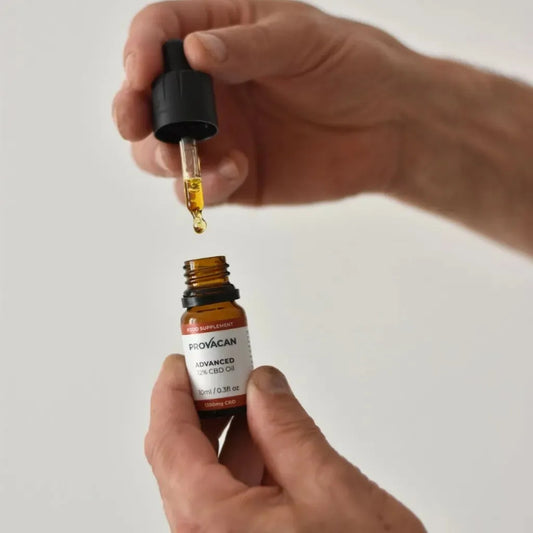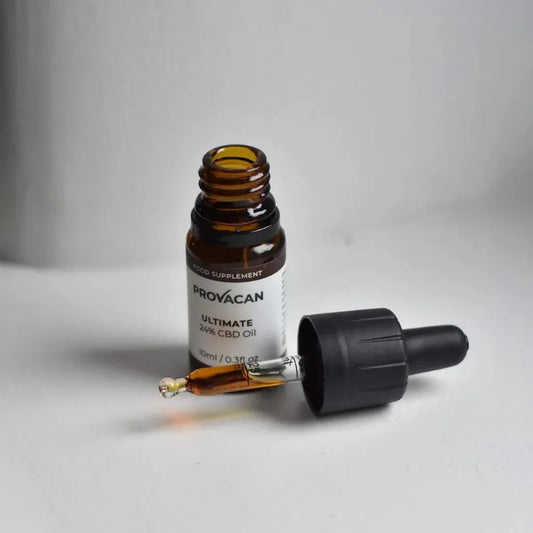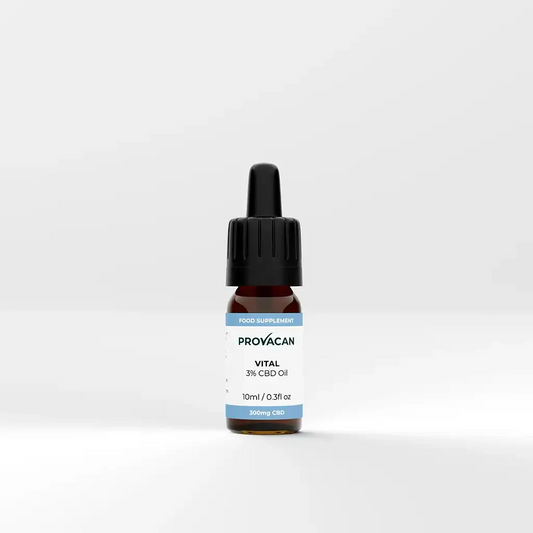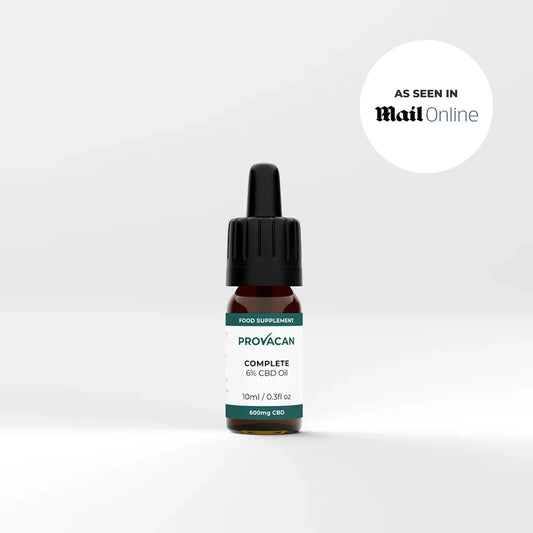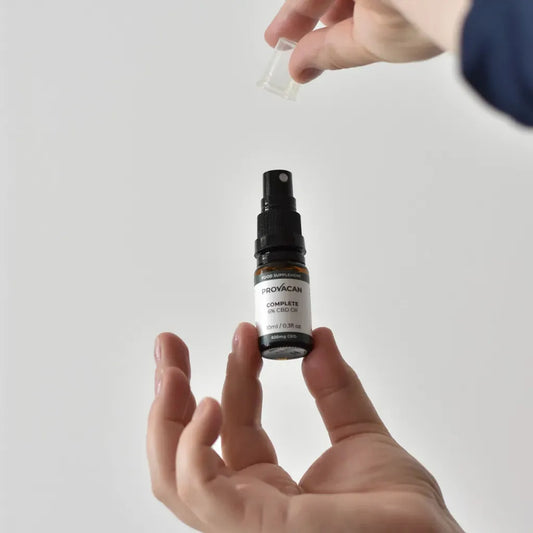Key Takeaways:
- CBG, or cannabigerol, may offer a range of anti-inflammatory, pain-relieving, and therapeutic effects, according to preliminary studies.
- CBG is gaining recognition for its potential health benefits and therapeutic properties, sparking interest in the wellness community.
- Research is emerging on the effects of CBG, shedding light on its unique characteristics and potential contributions to the field of cannabinoid science.
CBG, short for cannabigerol, may not be as well-known as its cannabinoid counterparts, but is gaining recognition for its potential health benefits and therapeutic properties. Here at Provacan, we stand as a beacon of knowledge and reliability in the cannabinoid domain and have gathered everything someone seeking out CBG needs to know.
In this article, we will explore the ins and outs of CBG, including its origins, unique characteristics, and emerging research on its effects. Join us on a journey through the intricacies of this fascinating cannabinoid as we unravel the mysteries behind CBG and its place in the world of wellness and cannabinoid science.
Introduction To CBG
Cannabigerol, or CBG, is one of over 100 identified cannabinoids found within the cannabis plant. While most people are familiar with CBD (cannabidiol) and THC (tetrahydrocannabinol), CBG is often less known but equally important. CBG is known as the "mother of all cannabinoids" because it is the precursor from which all other cannabinoids are synthesized.
CBG is non-psychoactive, meaning it does not produce the "high" typically associated with cannabis use. This makes it a popular choice for those seeking the potential health benefits of cannabinoids without the mind-altering effects.
Research on CBG is still in its early stages but shows promising potential. Like CBD, CBG is believed to interact with the endocannabinoid system in the body, which plays a crucial role in regulating various physiological functions. CBG is known for its potential as an anti-inflammatory agent, neuroprotectant, and may have antibacterial properties. It is also being studied for its potential in managing conditions like glaucoma, inflammatory bowel disease, and even cancer.
What Makes CBG Unique?
One of the primary factors that make CBG stand out is its low presence in most cannabis strains, making it a rare cannabinoid. CBG is typically found in very low levels in younger plants before it converts into other cannabinoids during the growth process. However, researchers are now exploring ways to breed cannabis plants specifically for higher CBG content, leading to its increased availability in the market.
Unlike THC, CBG is non-intoxicating, making it an attractive option for those seeking the potential benefits of cannabinoids without the psychoactive effects. CBG interacts with the endocannabinoid system in a different way than other cannabinoids, potentially offering unique therapeutic effects.
Another aspect that sets CBG apart is its potential as a versatile compound that may be used in combination with other cannabinoids to enhance their effects. The synergistic effects of different cannabinoids, known as the entourage effect, highlight the potential for CBG to enhance the overall therapeutic benefits of cannabis-based products.
The Science Behind CBG
Cannabigerol, or CBG, is one of over 100 cannabinoids found in the cannabis plant. While it is considered a minor cannabinoid compared to the more well-known CBD and THC, CBG is gaining attention for its potential therapeutic benefits.
CBG is a precursor to other cannabinoids, meaning that it is the chemical parent of compounds like THC and CBD. As the cannabis plant matures, CBG is converted into other cannabinoids, which is why it is typically found in lower concentrations in most strains of cannabis. Despite this, researchers are intrigued by CBG's unique properties and its potential to influence the endocannabinoid system in ways that other cannabinoids may not.
Studies have suggested that CBG may have anti-inflammatory properties, making it a possible candidate for managing conditions associated with inflammation. Additionally, CBG has shown promise in preclinical trials for its potential neuroprotective effects, indicating that it may be beneficial for supporting brain health.
One of the key advantages of CBG is its non-intoxicating nature, unlike THC, which is known for its psychoactive effects. This makes CBG an appealing option for individuals seeking the potential benefits of cannabinoids without the euphoric high commonly associated with cannabis use.
As research into CBG continues to evolve, scientists are uncovering more about this cannabinoid's mechanism of action and its potential therapeutic applications. With its growing popularity in the wellness community, CBG is poised to become a significant player in the future of cannabinoid-based therapies.
Health Benefits of CBG
Anti-Inflammatory Properties
CBG has shown significant promise in reducing inflammation in preclinical studies. By targeting inflammatory pathways, CBG may offer a natural and effective approach to managing various inflammatory conditions such as arthritis, inflammatory bowel disease, and more.
Analgesic Effects
Studies have suggested that CBG interacts with the body's endocannabinoid system to modulate pain perception. This interaction may result in analgesic effects, providing relief from pain without the potential side effects associated with traditional pain medications. CBG could be a valuable alternative for individuals seeking natural pain management solutions.
Neuroprotective Potential
Emerging research indicates that CBG holds neuroprotective properties that can help safeguard neurons from damage. By supporting overall brain health, CBG shows promise in potentially mitigating neurodegenerative disorders such as Alzheimer's and Parkinson's disease. Incorporating CBG into wellness routines may aid in maintaining cognitive function and protecting brain health.
Antibacterial Properties
CBG exhibits antibacterial properties, making it a promising candidate for combating bacterial infections, including those caused by antibiotic-resistant strains. By inhibiting the growth of certain bacteria, CBG offers a natural and effective alternative for individuals seeking safe and potent antibacterial solutions.
CBG vs. CBD: Unpacking The Differences
CBG
Structure: CBG is considered the "mother of all cannabinoids" as it serves as a precursor to other cannabinoids like THC and CBD.
Effects and Potential Benefits: Believed to have potential benefits for mood regulation, appetite stimulation, and pain relief.
Legal Status: Non-intoxicating cannabinoid, legal in most countries and areas where cannabis is legalized.
Research and Future Potential: Ongoing research to uncover new applications in health and wellness.
CBD
Structure: CBD is one of the most prevalent cannabinoids found in cannabis plants, alongside THC.
Effects and Potential Benefits: More commonly associated with reducing anxiety, inflammation, and promoting relaxation.
Legal Status: Non-intoxicating cannabinoid, legal in most countries and areas where cannabis is legalized.
Research and Future Potential: Several studies show promise, but ongoing research is required to explore further applications.
Side Effects And Safety Concerns
When it comes to CBG (cannabigerol), it is essential to understand that while this cannabinoid offers potential health benefits, there can also be side effects and safety concerns associated with its use. As with any supplement or wellness product, it is crucial to be aware of these factors before incorporating CBG into your routine.
One of the primary safety concerns with CBG, as with other cannabinoids, is the potential for interactions with certain medications. If you are currently taking prescription medications, it is advisable to consult with your healthcare provider before using CBG to ensure that there are no adverse interactions.
Additionally, some users may experience mild side effects when using CBG, such as dry mouth, dizziness, or changes in appetite. These side effects are typically not severe and tend to diminish as the body adjusts to the supplement. However, if you experience any persistent or concerning side effects, it is recommended to discontinue use and consult with a healthcare professional.
Legal Status Of CBG Around The World
The legal status of cannabigerol (CBG) varies around the world, mainly due to the association of CBG with cannabis plants. Since CBG is a minor cannabinoid found in cannabis, its legality often aligns with the legal status of cannabis in general.
In the United Kingdom, CBG is legal as long as it is obtained from industrial hemp strains approved by the European Union. Products containing CBG must comply with strict regulations regarding THC content to be legally sold in the UK.
It's essential for consumers to be aware of the legal status of CBG in their respective countries and to ensure that they are purchasing products from reputable sources that adhere to all regulations. As the CBD industry continues to evolve, so too will the legal status of CBG, providing more options for those seeking the potential wellness benefits of this cannabinoid.
An Overall Look At CBG
In conclusion, CBG (cannabigerol) is a promising cannabinoid that offers a range of potential health benefits. While not as well-known as CBD or THC, CBG has been shown to have anti-inflammatory, neuroprotective, and antibacterial properties, making it a valuable addition to the world of wellness and natural health remedies.
As research on CBG continues to expand, more consumers are becoming interested in the potential therapeutic effects of this lesser-known cannabinoid. Whether you're looking to address inflammation, support your mental well-being, or simply enhance your overall health and vitality, we at Provacan hope you’re now well informed enough to decide if CBG could be a beneficial addition to your wellness routine.
Read also:
Frequently Asked Questions on Cannabigerol (CBG)
What is CBG?
CBG, or Cannabigerol, is a non-intoxicating cannabinoid found in the cannabis plant. Often referred to as the "mother of all cannabinoids," it serves as a precursor to other cannabinoids, including THC and CBD. Unlike its more famous counterparts, CBG is present in lower concentrations in most strains of the plant.
How is CBG different from CBD?
While both CBG and CBD are non-psychoactive cannabinoids with potential therapeutic benefits, their difference lies in their pharmacology and effects on the body. CBG interacts with the endocannabinoid system (ECS) in a way distinct from CBD, potentially affecting the body differently. Moreover, CBG is found in lower concentrations in the cannabis plant compared to CBD.
What are the benefits of using CBG?
CBG has been researched for its potential therapeutic benefits. Preliminary studies suggest that it may help with conditions such as pain, inflammation, anxiety, and nausea. However, it's important to note that research is in its early stages, and more studies are needed to fully understand the benefits of CBG.
Is CBG psychoactive?
No, CBG is not psychoactive. Like CBD, it does not produce the "high" typically associated with THC, the main psychoactive component of cannabis.
Can CBG make you high?
No, CBG cannot make you high. Its chemical structure does not produce psychoactive effects, making it a safe option for those looking to explore the therapeutic benefits of cannabis without the intoxicating effects.
What are the side effects of CBG?
CBG is generally considered safe. However, like any cannabinoid, it may cause mild side effects in some people, such as dry mouth, mild lightheadedness, or drowsiness. These effects are usually temporary and can often be mitigated by adjusting the dose.
How is CBG extracted from the cannabis plant?
CBG is extracted from young cannabis plants when the CBG content is higher than in fully matured plants. The extraction process typically involves using CO2 or ethanol to separate the cannabinoid from the plant material, followed by purification to ensure high purity and quality of the CBG extract.
Is CBG legal?
In the UK, CBG is legal, provided it is derived from hemp strains that contain less than 0.2% THC. The legal status of CBG can vary in other countries, so it's important to check local laws and regulations.
Can CBG be used in conjunction with CBD?
Yes, CBG can be used in conjunction with CBD. Many people find that using CBG and CBD together may enhance the overall effectiveness of both cannabinoids, a phenomenon known as the "entourage effect." However, it's always a good idea to consult with a healthcare professional before starting any new supplement regimen.
Can CBG help with anxiety?
Preliminary research and anecdotal evidence suggest that CBG may have anti-anxiety effects. By potentially modifying how the brain’s receptors respond to serotonin, CBG could help manage anxiety. However, more clinical studies are needed to fully understand its impact and confirm its efficacy.
Sources:
- Russo, Ethan B. “The Case for the Entourage Effect and Conventional Breeding of Clinical Cannabis: No ‘Strain,’ No Gain.” Frontiers in Plant Science, vol. 9, 2018, doi:10.3389/fpls.2018.00196.
- Cascio, M G et al. “Evidence that the plant cannabinoid cannabigerol is a highly potent alpha2-adrenoceptor agonist and moderately potent 5HT1A receptor antagonist.” British journal of pharmacology vol. 159,1 (2010): 129-41. doi:10.1111/j.1476-5381.2009.00515.x.





